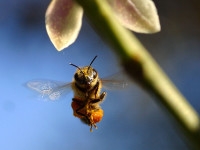EU Adds Fipronil to Banned Pesticides List

The European Commission voted this week to ban fipronil, in the wake of its recent decision to restrict the use of three neoniconitoid pesticides to tackle the decline of Europe’s bee population.
The European Union will no longer allow use of fipronil to treat maize and sunflower seeds as of the end of this year, while treated seeds can be sown up until Feb. 28, 2014.
BASF, which holds the patent rights in many countries for producing and selling fipronil, a broad-use insecticide that belongs to the phenylpyrazole chemical family, disagreed with the decision. It said the move will limit growers’ access to valuable and approved technologies.
The proposal follows a scientific risk assessment carried out by the EU’s watchdog agency, the European Food Safety Authority, published in May. It concluded that fipronil “poses a high acute risk” to Europe’s honey bee population when used as a seed treatment for maize.
The measures are as follows:
- Restrict the crops where fipronil can be used as a seed treatment;
- Authorizations may be granted for the treatment of seeds that will only be sown in greenhouses. However, this exception does not apply to leeks, shallots, onions and brassica vegetables (such as Brussel sprouts, cauliflower or broccoli), where treated seeds can also be sown in the field, as the harvest of these crops takes place before flowering;
- The treatment of maize and sunflower seeds will no longer be authorized;
- The Commission will initiate a review of the restrictions within two years.
National authorities are responsible for ensuring the restrictions are correctly applied, according to the Commission.
BASF Responds
BASF said that along with the majority of experts, it remains convinced that the decline in bee populations is caused by multiple and complex factors and that the restriction of fipronil will not contribute to protecting bees.
“The decision regarding fipronil was derived from an assessment that focused heavily on new technical areas for which no established regulatory evaluation criteria are yet available. Moreover, sound data from field studies that underpin the safe use of our product for bees were not considered sufficiently,” said Jürgen Oldeweme, Senior Vice President Global Product Safety and Regulatory Affairs, BASF Crop Protection. “We are certain that Europe can achieve both – the protection of pollinators and the support of European agriculture – but for that all stakeholders must engage in a comprehensive action plan to address the real root causes of the decline in bee health.”
The German multinational said that it has been working with scientists, farmers and beekeepers for years to understand how to improve bee health. One of the solutions coming out of that work is a flowering strip to support bee nutrition. Flowering strips are plants sown in strips or blocks, for bees and other flower-visiting insects. It also partnered with the Canadian company NOD Apiary Products to offer European beekeepers Mite Away Quick Strips, an innovative solution to control the Varroa destructor mite in beehives, a serious mite that impairs bee health.
“We will support the European Commission in the development of extensive measures that can benefit bees while securing food production in Europe. We do not believe that the planned restriction of fipronil uses will accomplish that,” Oldeweme added.





